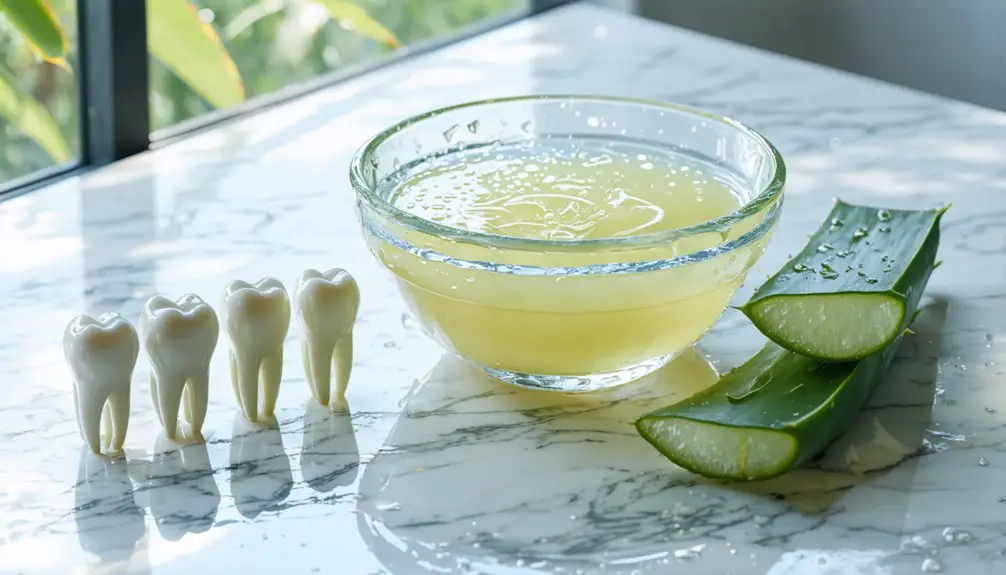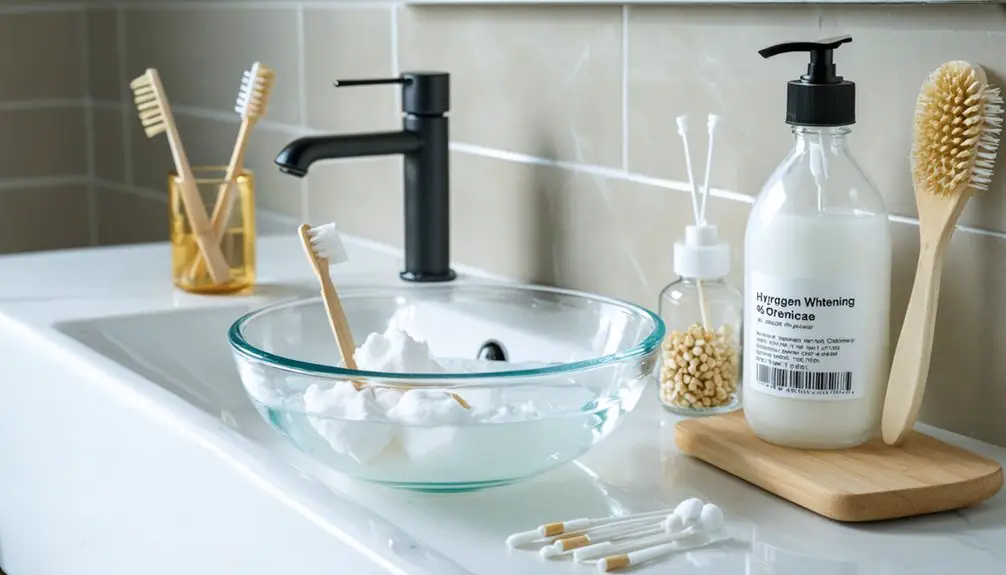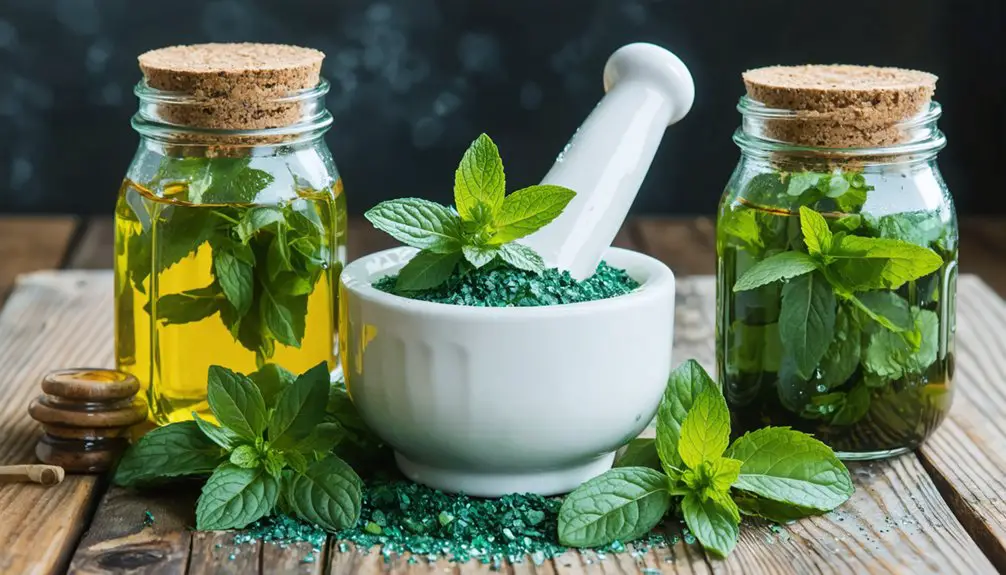Your teeth and gums can benefit greatly from aloe vera gel‘s natural therapeutic properties. It prevents cavities and plaque buildup through strong antibacterial action, reduces gum inflammation with essential nutrients, fights harmful oral pathogens like E. faecalis, accelerates wound healing through enhanced collagen production, and protects against fungal and viral infections. These scientifically-backed benefits make aloe vera gel a powerful addition to your dental care routine, with even more advantages to discover.
Key Takeaways
- Aloe vera gel’s strong antibacterial properties fight cavity-causing bacteria and reduce plaque buildup as effectively as commercial toothpastes.
- The gel’s anti-inflammatory compounds reduce gum inflammation, bleeding, and sensitivity while supporting healthy tissue repair.
- Natural enzymes and polysaccharides prevent bacteria from sticking to teeth, helping maintain better oral hygiene.
- Promotes faster healing of mouth ulcers and oral wounds through enhanced collagen production and tissue regeneration.
- Effectively combats oral infections by targeting harmful pathogens like E. faecalis and S. mutans while protecting gum health.
Natural Cavity and Plaque Prevention
While traditional dental care products rely heavily on synthetic compounds, aloe vera gel offers a natural yet potent solution for cavity and plaque prevention. You’ll find its antibacterial properties rival or exceed commercial toothpastes in controlling cavity-causing organisms, making it an excellent choice for cavity disinfection after dental procedures. This natural approach dates back to the 10th century healing traditions. The gel’s active compounds reduce cariogenic bacteria significantly after application.
When you incorporate aloe vera gel into your dental care routine, you’re supporting effective plaque management through multiple mechanisms. The gel’s enzymes and polysaccharides interfere with bacterial adhesion, while its natural compounds selectively target harmful bacteria.
For best results, combine aloe vera products with regular scaling and root planing. The gel’s gentle nature preserves pulp health during cavity treatments, yet maintains powerful antimicrobial action against oral pathogens, helping you maintain a balanced oral ecosystem.
Powerful Anti-Inflammatory Effects for Gum Health
Because gum inflammation can lead to serious periodontal issues, aloe vera‘s powerful anti-inflammatory properties make it an invaluable natural treatment for maintaining ideal gum health.
You’ll find that aloe vera directly targets gingival inflammation through its rich content of vitamins B1, B2, B6, and C, along with essential amino acids that support tissue repair.
The gel’s anthraquinones and plant sterols work to enhance your periodontal immune response while reducing harmful inflammatory reactions.
Clinical studies show it’s particularly effective when combined with regular dental cleaning procedures.
Regular use of aloe vera products can prevent tooth decay while protecting gum tissue.
You’ll notice reduced bleeding, swelling, and gum sensitivity as aloe vera stabilizes capillary walls and soothes irritated tissue.
For best results, use aloe vera gel products regularly as part of your oral care routine, especially after professional dental cleanings.
Research demonstrates that aloe vera treatments help speed up healing in patients suffering from gingivitis.
Antimicrobial Defense Against Oral Pathogens
Aloe vera’s antimicrobial properties extend its oral health benefits beyond fighting inflammation. You’ll find it particularly effective against stubborn bacterial resistance, targeting key pathogens like E. faecalis and S. mutans that commonly cause dental problems.
Through biofilm disruption, aloe vera prevents harmful bacteria from adhering to your teeth and gums, working similarly to chlorhexidine mouthwash.
When you incorporate aloe vera into your oral care routine, it attacks bacteria in both their free-floating and biofilm states, making it especially useful for treating periodontal pockets and root canal infections. Research indicates it delivers comparable effectiveness to chlorhexidine in controlling dental plaque and gingivitis.
The gel’s dual action of fighting bacteria while promoting remineralization helps protect your patients’ teeth from recurring infections. Clinical studies support its use as an alternative to conventional antimicrobials, particularly in non-surgical periodontal treatments.
Accelerated Healing of Oral Wounds and Ulcers
Through its complex healing mechanisms, aloe vera gel considerably accelerates the recovery of oral wounds and ulcers by enhancing fibroblast activity and tissue regeneration.
When applied to oral wounds, aloe vera stimulates the production of fibroblasts and collagen, while promoting faster epithelial cell migration. Animal studies reveal that the higher dose 500mg/kg provides optimal wound healing results. You’ll notice improved wound healing through its anti-inflammatory properties and enhanced blood vessel formation.
- Mannose-6-phosphate in aloe vera activates macrophages, leading to increased fibroblast production and faster tissue repair
- Active compounds reduce inflammation and histamine activity, minimizing swelling and discomfort during healing
- Enhanced angiogenesis ensures better oxygen and nutrient supply to healing tissues
- Increased collagen synthesis and cross-linking creates stronger tissue structure, reducing the risk of wound reopening
Protection Against Fungal and Viral Infections
Beyond its wound-healing properties, the antimicrobial nature of aloe vera gel provides significant protection against common oral fungal and viral infections.
The gel’s antifungal mechanisms effectively combat Candida albicans, the primary fungal species in your mouth, while reducing harmful biofilm formation. Its natural compounds, including anthraquinones like aloetic acid and aloin, work to inhibit fungal growth.
You’ll find aloe vera’s antiviral properties particularly effective against herpes simplex and herpes zoster infections. When applied topically, it interferes with viral replication and reduces lesion severity. Recent studies show that aloe vera can provide competitive pain relief compared to traditional treatments for recurring mouth ulcers.
As a complementary treatment, you can use aloe vera gel-containing dentifrices or mouth rinses to decrease your oral microbial load. This natural approach offers broad-spectrum protection while supporting your oral mucosal immunity without adverse effects.
Frequently Asked Questions
How Long Should Aloe Vera Gel Be Left on Teeth Before Rinsing?
Clinical studies show 3-5 minutes is ideal – you’ll want to keep aloe vera applications on your teeth for several minutes to maximize dental health benefits before thoroughly rinsing your mouth.
Can Children Safely Use Aloe Vera Gel for Dental Care?
You can safely use aloe vera gel for children’s dental care with proper safety precautions. Monitor dosage recommendations, avoid products containing aloe latex, and guarantee they don’t swallow mouthwash during use.
Does Aloe Vera Gel Stain Teeth or Dental Restorations?
Clear as crystal, aloe vera gel won’t stain your teeth or dental work. Unlike chlorhexidine, it’s proven safe for dental materials and may help maintain whiteness by reducing plaque buildup over time.
How Often Should Aloe Vera Gel Be Applied to Teeth Daily?
You should apply aloe vera gel to your teeth twice daily during regular dental hygiene, typically when brushing. For gum massage applications, limit usage to once weekly to promote healing.
Can Aloe Vera Gel Be Mixed With Regular Toothpaste During Brushing?
You can safely mix aloe vera gel with your regular toothpaste while brushing. The compatibility enhances toothpaste benefits, offering additional antimicrobial and anti-inflammatory properties for your oral care routine.
References
- https://pmc.ncbi.nlm.nih.gov/articles/PMC4253296/
- https://www.todaysrdh.com/ancient-cures-modern-times-surprising-benefits-aloe-vera-oral-health/
- https://decisionsindentistry.com/article/role-of-aloe-vera-in-oral-health-management/
- https://www.healthline.com/health/aloe-vera-for-gums
- https://pmc.ncbi.nlm.nih.gov/articles/PMC4439686/
- https://journal.ijmdes.com/ijmdes/article/download/55/54/54
- https://www.sciencedaily.com/releases/2009/07/090717150300.htm
- https://pmc.ncbi.nlm.nih.gov/articles/PMC9095349/
- https://scholarscompass.vcu.edu/cgi/viewcontent.cgi?article=1005&context=denh_student
- https://deltadentalazblog.com/aloe-vera-and-oral-health-a-home-remedy-for-tooth-infection/



